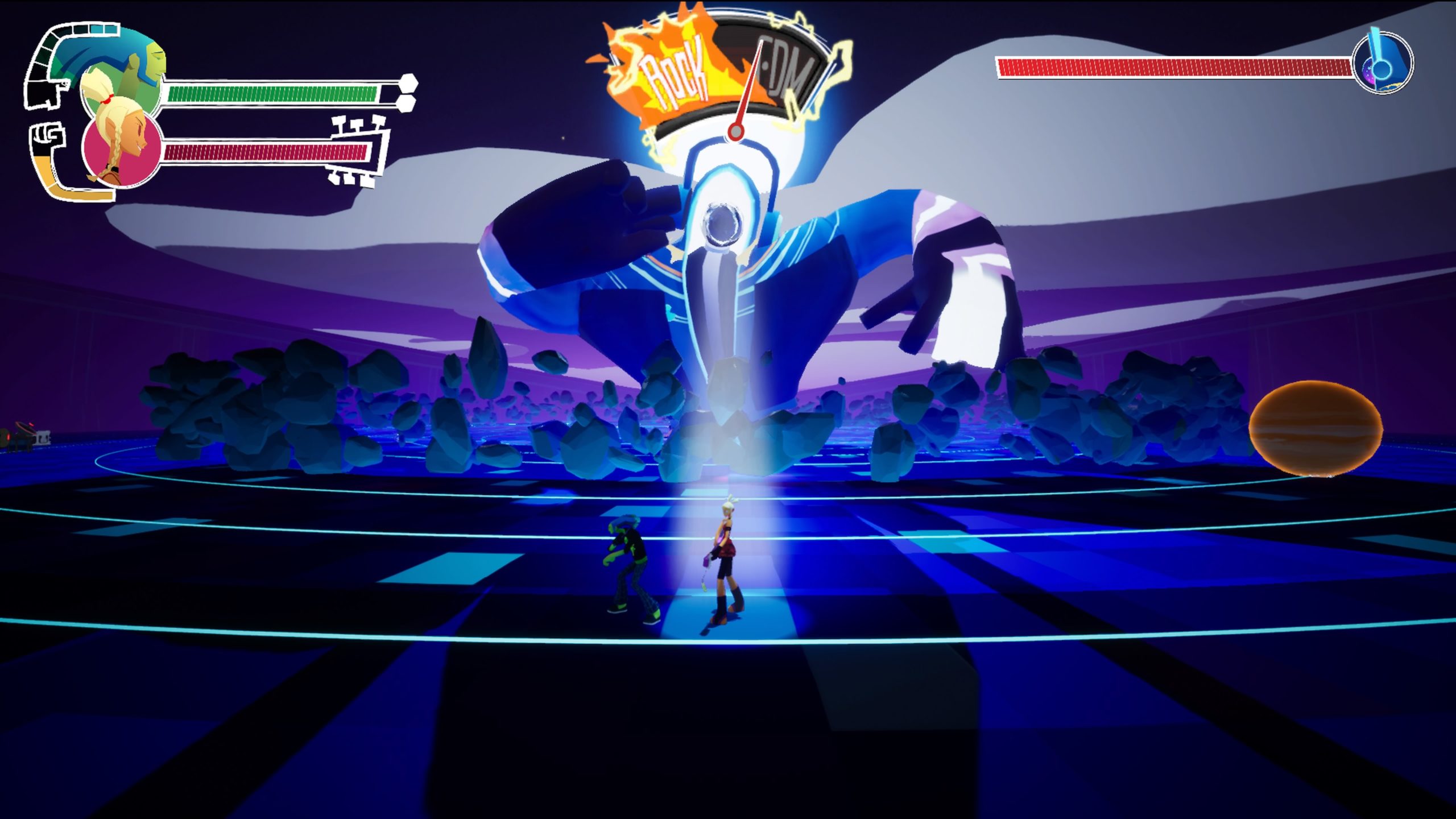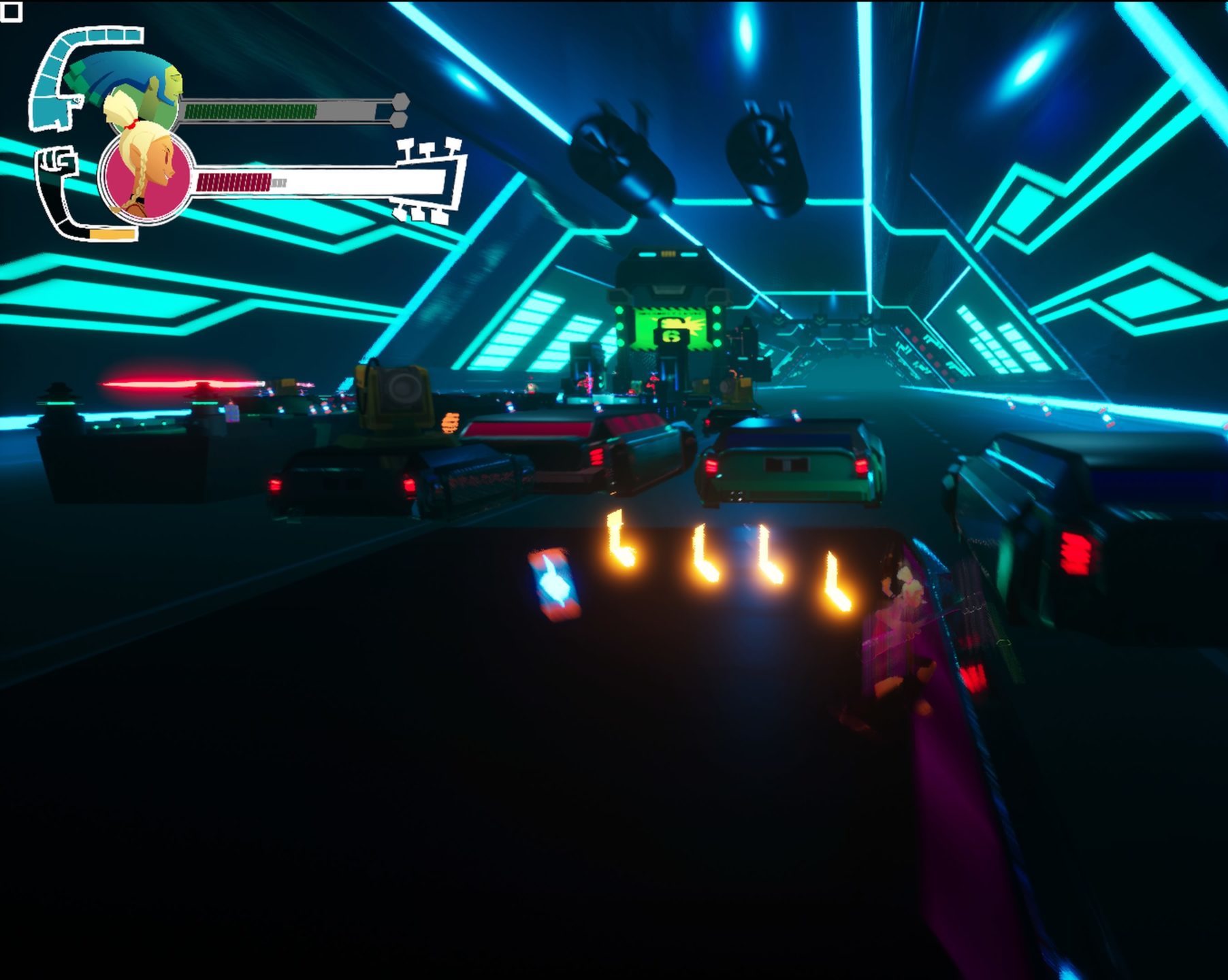Platforms:
Xbox One, PS4, PC
Released:
August 25, 2020
Publisher:
Sold-Out Software
Developer:
Metronomik,
No Straight Roads feels nostalgic in a way that’s hard to describe. There’s something about it that screams ‘2002 action game’. It might be the chunky character design and over the top animations, or maybe it’s the unapologetically loud colours and jaunty music that makes the game feel like a classic from the PS1 era. Even the 2D character art feels nostalgic: a cross between Jet Set Radio and the art style of the band Gorillaz. Amongst the many ultra-realistic and gritty games of today, it stands out amongst the crowd.
This game by Metronomik stars an up-and-coming rock duo, Mayday and Zuke, in their quest to liberate their home of Vinyl City from the sinister organisation NSR. It can be played solo by switching between characters, or co-op with a pal. There are so, so many amazing concepts in No Straight Roads, but it’s tragically held back by its “just ok” gameplay.
Nostalgia hit me immediately once I started the game. You just don’t see this kind of character design anymore – exaggerated features and loud colours, and personalities with so much sass that you won’t know if you hate them or love them. The idea of a city powered by music is interesting enough on its own, but there’s the added humour that the charts are topped by EDM, of all genres. Vinyl City isn’t some sprawling map with far too many sidequests to be feasible – it’s there to show off what a cool word it is while you go from one level to the next. It’s refreshing to be a tourist through a shorter, streamlined experience. It’s unclear if it was the intention of the developers to create a game that emulated a bygone era of video games, but as I soon realised, nostalgia is a double-edged sword.
Mayday and Zuke are entertaining enough characters, although whether you love or hate them will depend on your tolerance for cheese. Mayday is your typical hotheaded protagonist who makes her opinion known at every opportunity, while Zuke is much more reserved. It’s an obvious dynamic, but it’s comfortable and easy to identify with, especially for younger players. Mayday and Zuke must challenge each member of NSR by ‘hijacking’ their concert and defeating them with the power of ROCK! Between each level, you’ll have an opportunity to unlock new abilities and explore Vinyl City. Without sidequests, there’s not much incentive for exploration (though there are some collectables) so it’s a testament to just how interesting the setting is that I found myself exploring anyway.

Bosses are the main meat of the game, and they certainly are a spectacle. They’re creative and full of life, with unique designs and concepts. Each boss is based off a different kind of electronic music, such as synthwave, Vocaloid pop, and neoclassical.
It’s easy to see what they were going for here. It’s an epic battle between music genres, as well as ideals. The concepts at play here are great. It’s humorous, charismatic, and dramatic – each cutscene had me laughing at least once. It feels cohesive and well put together, which is what makes it all the more disappointing that the gameplay doesn’t quite live up.
The journey to each boss is a not-very-interesting platforming/action segment with gameplay that may cause a war flashback to 2002. The camera angle leaves only a vague idea of where your character will land, and attacks feel sluggish leading to a lot of damage taken that doesn’t feel deserved.
This kind of gameplay persists throughout the entire game. The high hopes No Straight Roads set with its fun premise, nostalgic feel, and great music are sadly not met. Although the game’s tutorial would have you gearing up for a rhythm-based battle system, that’s really not what it is. Enemy attacks can be avoided and parried by paying attention to audio cues and beats, but these beats don’t operate in line with the game’s backing track. They have their own schedule, meaning you’re more likely to just rely on visual cues as you try desperately to take control of the messy battlefield. I was never able to get a real sense of rhythm out of any of the levels – even the bosses. For a game that’s trying so hard to be about the music, it just falls flat.
It puts a damper on everything. Mayday and Zuke soon get access to a few different special attacks and abilities to choose between, but none of them avoid the same issues. The attacks are flashy and fun to watch, and certainly do make getting through the pre-boss levels much easier. But even with these upgrades, the gameplay never lifted above average. It’s truly a shame because everything else about this game is a delight.

Whenever the game doesn’t want you to fight things, it’s great. The ‘downtime’ segments where you can just engage with the world, like feature in a pirate radio interview or have a rap battle with Zuke’s brother, are the best times to be had in this game. The way you unlock skills by gaining new fans makes Mayday and Zuke’s journey to the top of the charts feel more diegetic, and it’s refreshing not to be pulled 5 different ways for various sidequests.
But as soon as the weapons come out, the other side of nostalgia catches up. The platforming and the unwieldy attacks are a particularly unwelcome blast from the past, especially when there are plenty of examples of games doing this right within the past few years. It just doesn’t feel masterful or seamless.
It truly feels like a game I would have played in my youth, and would replay now in front of a friend; begging them to understand why I continue to think it’s a good game despite its sorely dated gameplay. ‘Don’t you see? The characters and world are so cool! The music is so great! Sure, the gameplay isn’t great, but it’s just old!’ Problem is, though… it isn’t old. It’s brand new.
“It’s an epic battle between music genres, as well as ideals.”
Again, it’s clear what they intended. The short levels are designed to be replayed and perfected. After completing the main game, several new modes are unlocked for each level and it’s obvious that you’re supposed to want to go back for more. And if the gameplay were better, it would be a great incentive to do just that. But while the action was enough to engage me through to the end once, I don’t think it would be enough for multiple playthroughs.
Due to circumstances outside anyone’s control, I wasn’t able to invite any pals over to try out the co-op mode. I can see the ways in which my experience might have been improved: there are several abilities that are designed to benefit your partner mid-battle. Two players might boost the flow of action and add some excitement. But it won’t fix what the game truly needed, which is cohesion between all its gameplay elements. Despite the entire theme of the game, the rhythm elements were barely noticeable, leaving only the action as the meat of the gameplay. And compared to how interesting the setting is, the action just isn’t anything special.
6
Decent
Positive:
- Characters, style, and setting all great
- Unique and interesting world
- Comedic writing
Negative:
- Outdated gameplay
- Rhythm barely comes into it
- A bit short
Taking into account everything No Straight Roads does right and wrong, it truly does feel like a game from the 2000s that I would be nostalgic as hell for. The music’s good and the story is fun, if silly. The nostalgic feeling is enough that I don’t mind the dated gameplay, at least not for the first playthrough. But this game isn’t from the 2000s. It’s from 2020, and the trappings from that earlier era really hold it back. I have no doubt that the charm and uniqueness of No Straight Roads will appeal to many, however, and I would be keenly interested in a sequel.





